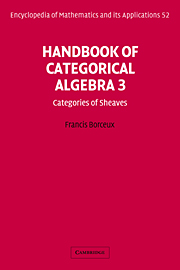8 - The axiom of infinity
Published online by Cambridge University Press: 04 February 2010
Summary
A set is infinite when it is isomorphic to a proper subset; the axiom of infinity asserts the existence of an infinite set. From this axiom one easily constructs the set ℕ of integers… which is a special instance of an infinite set. We shall perform an analogous construction in a topos. Since ℕ itself is infinite, it would have been equivalent to take as an axiom the existence of the infinite set ℕ. This is what we do first, characterizing ℕ by a universal property which makes sense in a context much more general than topos theory. After that we show that in a topos, the categorical description of ℕ is equivalent to the usual Peano axioms.
In a topos with natural number object ℕ, we introduce on ℕ the addition, the multiplication and the poset structure. We develop the first rudiments of arithmetic, including the famous law of trichotomy and the theorem of euclidean division.
We also pay some attention to the notion of a finite object in a topos, independently of the existence of a natural number object. We do not develop the corresponding theory very much, but list some properties in the exercises.
The natural number object
First of all, the categorical definition of the natural number object.
- Type
- Chapter
- Information
- Handbook of Categorical Algebra , pp. 453 - 485Publisher: Cambridge University PressPrint publication year: 1994

